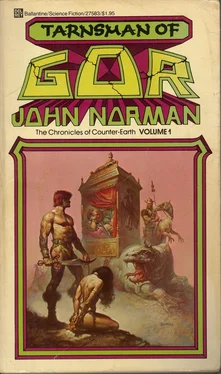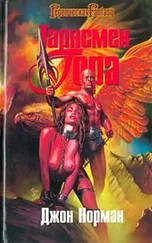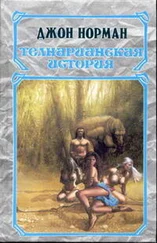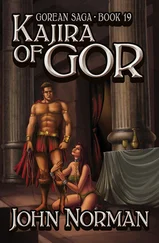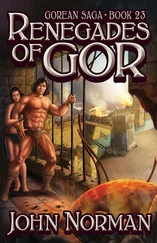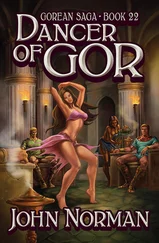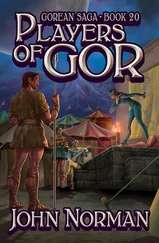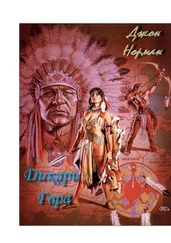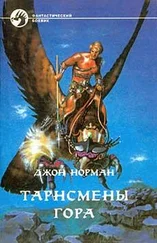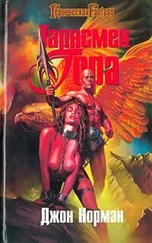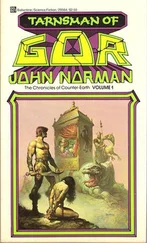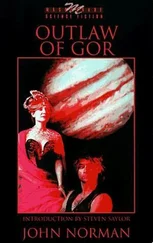Pa-Kur, without taking his eyes off me, gestured with his sword toward the men of Ar. "Destroy this rabble."
Instantly the Assassins and the men from Pa-Kur's horde fell upon the men of Ar, who stood firm under the sudden onslaught, meeting them blade for blade. The men of Ar were outnumbered perhaps three to one, but I knew they would give a good account of themselves.
Pa-Kur approached warily, confident in his superior swordsmanship, but, as I expected, determined to take no chances.
We met almost over the body of Talena, the tips of our blades touching alertly, once, twice, each sounding the other out. Pa-Kur feinted, not exposing himself, his eyes seeming to watch my shoulder, noting how I parried the blow. He tested me again and seemed satisfied. He then began testing elsewhere, methodically, using his sword almost as a physician might use a stethoscope, applying it first to one area and then to another. I drove in once directly. Pa-Kur slid the blow lightly to one side, almost casually. While we touched blades almost as if involved in some bizarre ritualistic dance, there was the ringing, the clanging of fiercer swordplay around us, as the men of Pa-Kur engaged the men of Ar.
At last Pa-Kur stepped back, out of the range of my blade. He seemed complacent. "I can kill you," he said. I supposed what he said was true, but it may have been a calculated remark, something to put the enemy off balance, like announcing an unseen mate in chess to provoke an opponent into making an unnecessary defensive move, causing him to lose the initiative. That sort of thing would be effective only once with a given player, but in swordplay once would be sufficient.
I responded in kind, to taunt him. "How is it that you can kill me if I do not turn my back?" I asked. Somewhere within that inhumanly calm exterior there lay a vanity that must be vulnerable. I remembered the incident of the crossbow and the tarn disk over the Vosk. That, in its way, had been a rhetorical gesture on the part of Pa-Kur.
A momentary annoyance flickered through the stony eyes of Pa-Kur, and then a small, sour smile appeared on his lips. He again approached, but cautiously as before, still taking no chances. My ruse had failed. His, if ruse it was, had also. If it had not been a ruse, I would soon know, if only briefly.
Our blades met again, this time in a flash of bright, clean sound. He had begun much as at first, moving toward the same area, only with more familiarity, more rapidity. This led me to puzzle as to whether this was the weaker part of my defense and where his attack would come, or if it was a blind to keep my mind from another area until suddenly he drove through for the kill.
Such questions I forced from my mind, keeping my eyes on his blade. In affairs of the sword, there is a place for outguessing the opponent, but there is no place for anxious speculation; it paralyzes, puts you on the defensive. He had toyed with me. Now I determined not to allow him to control the exchanges. If I was defeated, I determined that it would be a man that would defeat me, not a reputation.
I began to press forward in attack, exposing myself more, but beating back his defense by the sheer weight and number of my blows. Pa-Kur withdrew coolly, meeting my attack effortlessly, letting me weary my sword arm; hating him, I admired him; wanting to destroy him, I acclaimed his skill.
When my attack lapsed, Pa-Kur did not press his own. He clearly wanted me to attack again. After several such onslaughts, my arm would be weakened to the point where it could not withstand the fury of his own offense, which was legendary on Gor.
As we fought, the men of Ar, fighting brilliantly for their city, their honor and loved ones, pushed back the men of Pa-Kur again and again, but from the interior of the cylinder swarmed more men of the Assassin. For each enemy who fell, it seemed three sprang up to take his place. It was only a matter of time before the last of the men of Ar would be forced over the edge of the cylinder.
Pa-Kur and I engaged again and again, I pressing the attack, he withstanding it and waiting. During this time Talena, though bound hand and foot, had struggled to her knees, and she watched us fight, her hair and the folds of her robe blown by the wind that whipped across the roof of the cylinder. Seeing her and the fear for me in her eyes, I seemed to gain redoubled strength, and for the first time it seemed to me that Pa-Kur was not meeting my attack as surely as he had previously.
Suddenly there was a sound like thunder and a great shadow was cast across the roof of the cylinder, as if the sun had been obscured by clouds. Pa-Kur and I backed away from one another, each quickly trying to see what was happening. In our fighting we had been all but oblivious of the world around us. I heard the joyous cry, "Sword Brother!" It was Kazrak's voice! "Tarl of Ko-ro-ba!" cried another familiar voice that of my father.
I looked up. The sky was filled with tarns. Thousands of the great birds, their wings clapping like thunder, were descending on the city, flying onto the bridges and down to the streets, darting among those spires no longer protected with the terrible defense of the tarn wire. In the distance the camp of Pa-Kur was in flames.
Across the bridges of the great ditch, rivers of warriors were flowing. In Ar the men of Marlenus had apparently reached the great gate, for it was slowly closing, locking the garrison inside, separating them from the horde without. The horde, taken by surprise, was disorganized, unformed for battle. It was milling about in confusion, panic-stricken. Many of Pa-Kur's tarnsmen were already streaking from the city, seeking their own safety. Undoubtedly, the horde of Pa-Kur greatly outnumbered the attackers, but it did not understand this. It knew only that it had been taken by surprise, at a disadvantage by undetermined numbers of disciplined troops that were pouring down on them, while from above, enemy tarnsmen, unchallenged, emptied their quivers into their ranks. Moreover, with the closing of the great gate, there was no refuge in the city; they were trapped against the walls, packed like cattle for the slaughter, trampling one another, unable to use their weapons.
Kazrak's tarn had alighted on the roof of the cylinder, and a moment afterward my father's and perhaps fifty others. Behind Kazrak, sharing his saddle, in the leather of a tarnsman, rode the beautiful Sana of Thentis. The Assassins of Pa-Kur were throwing down their swords and removing their helmets. Even as I watched, my father's tarnsmen were roping them together.
Pa-Kur had seen what I had seen, and now once again we faced one another. I gestured to the ground with my sword, offering quarter. Pa-Kur snarled and rushed forward. I met the attack cleanly, and after a minute of fierce interplay both Pa-Kur and I realized I could withstand the best he had to give.
Then I seized the initiative and began to force him back. As we fought and I forced him back step by step toward the edge of the lofty marble cylinder, I said calmly, "I can kill you." I knew I spoke the truth.
I struck the blade from his hand. It rang on the marble surface.
"Yield," I said. "Or take your sword again."
Like a striking cobra, Pa-Kur snatched up the sword. We engaged again, and twice my blade cut him; the second time I nearly had the opening I desired. It was now a matter of only a few strokes more and the Assassin would lie at my feet, lifeless.
Suddenly Pa-Kur, who sensed this as well as I, hurled his sword. It slashed through my tunic, creasing the skin. I felt the warm, wet sensation of blood. Pa-Kur and I looked at each other, now without hatred. He stood straight before me, unarmed but with all the nonchalant arrogance of old.
"You will not lead me as a prisoner," he said. Then, without another word, he turned and leaped into space.
Читать дальше
